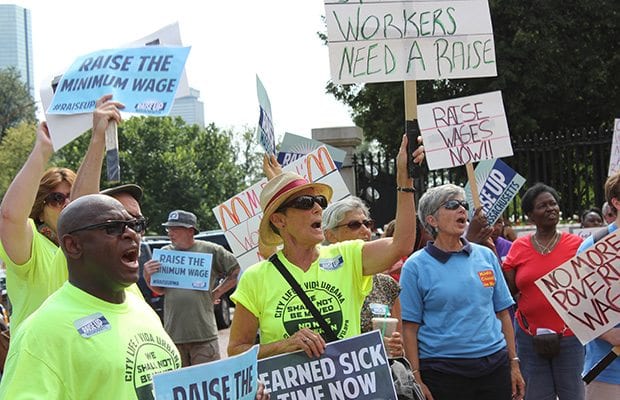

More than 50 Massachusetts organizations launched a signature-raising drive last week to push the state legislature to raise the minimum wage and ensure that all workers earn sick time if they or family members are ill.
On Friday, Raise Up Massachusetts, a group of community, faith and labor organizations, began its campaign to collect signatures on petitions to have questions about minimum wage and sick time on the November 2014 election ballot.
Each petition needs about 100,000 signatures to get a question or proposed measure on the ballot. The deadline is Nov. 20.
If enough signatures are collected — and then certified — by the deadline Massachusetts legislators would have until May 2014 to pass their own laws on the minimum wage and sick time issues.
The petition questions would then never go to ballot.
Lew Finfer is director of the Massachusetts Communities Action Network and a steering committee member of Raise Up Massachusetts. He said the signatures are crucial because of the potential ballot questions as well as the message these questions would send to state legislators now deliberating on several bills to raise the minimum wage and guarantee earned sick time.
Finfer points out that this is exactly what happened when Massachusetts passed its health-care law in 2008.
Legislators took note of the signatures collected for a petition and the public demand for a state health-care law and passed a law before it even got to a vote.
“We feel like we [would] have a really good chance to win if it was on the ballot next year,” Finfer said. “But the most important part of the campaign really might be the signature gathering. If you get the signatures it sets up a different dynamic in that the people who organized the effort have a lot more chance to get what they want.”
Raise Up Massachusetts already has some high-profile support from U.S. Sens. Elizabeth Warren (D-Mass.) and Ed Markey (D-Mass.) Both have lent their signatures to the effort already.
“Our workers are some of the most productive in the world, but no matter how hard they work, the minimum wage leaves them further and further behind,” Sen. Warren said in a statement. “Hard-working men and women who are busting their tails in full-time jobs shouldn’t be left in poverty. It’s long past time to raise the minimum wage, which will help Massachusetts’ working families and strengthen our economy.”
What Raise Up Massachusetts wants, Finfer says, is a “living wage” for about 650,000 workers in the state who make the minimum of $8 an hour and about 1 million workers who don’t have earned sick time. Those without earned sick time are almost one-third of the state’s workers and are at risk of losing their jobs if they stay home to care for themselves or for a sick child.
“It is a really big number of people who are affected and who would benefit if this would pass,” Finfer said.
The campaign is pushing to raise the minimum wage to $10.50 an hour and raise the tipped-employee wage to $6.60 an hour by 2016.
Raise Up Massachusetts is also looking to enact an earned sick time benefit that would give those who work for companies of 11 or more employees the ability to get five paid sick days a year and five unpaid sick days for those working for smaller companies.
Earned sick time gives workers the time to get preventative care such as doctor’s appointments, eye exams and yearly physicals. States and municipalities that have implemented earned sick time have seen job growth, and most employers report no negative impact on their profitability.

Raise Up Massachusetts has an office on Mount Vernon St. in Dorchester and is pushing its drive to collect signatures out into the community.
Finfer emphasizes that it will take help from many volunteers in order to get the signatures needed.
Officially, the petitions need 68,000 signatures of registered voters each to go to ballot, but because the signatures have to be checked and validated the standard is to get to 100,000 to ensure the minimum is met.
Finfer says that Raise Up Massachusetts is asking organizations to set a goal to collect a specific number of signatures before Nov. 20, with efforts kicking off all over Boston this past weekend.
Religious organizations and places of worship will play a big part, as will volunteers at stores and other high traffic destinations. Signatures will also be collected at the election polls on Sept. 24 and Nov. 5.
“There is a big effort to be made to get people to work on this,” said Finfer. “It will just keep growing and a lot of people are making commitments.
“Any individual can get petitions and get signatures in their circles,” he added. “There has to really be that kind of grassroots, bottom-up effort to be successful.”
While collecting 200,000 signatures in less than three months may seems like daunting task, Finfer is hopeful. “There are not too many vehicles where you could help a million people get better wages,” he said.






